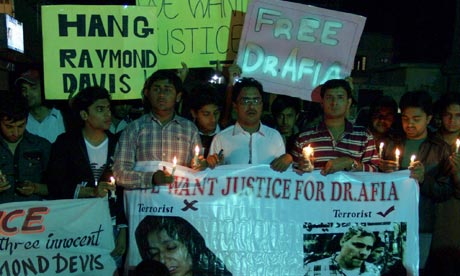-
Monday 14 February 2011 16.30 GMT
- Article history

Lawyers for Aafia Siddiqui, a Pakistani woman jailed for 86 years by a US court last year, have released an audiotape that purports to explain her mystery disappearance almost eight years ago.
On the tape a man identified as Imran Shaukat, a senior Pakistani counter-terrorism official, says that Siddiqui was picked up by Pakistan's police in March 2003 and handed to the county's intelligence service, ISI. "I caught her," he says.
The Pakistani government has always denied holding Siddiqui, a US-educated mother of three who disappeared between 2003 and 2008 and whose case has become a powerful symbol of anti-American sentiment in Pakistan.
The tape, said to have been secretly recorded last year, seems to confirm that she and her three children were first detained by police in March 2003 as they travelled to Islamabad.
"Do you know what? I saw her face. That time, when I caught her, she was very American," Shaukat is quoted as saying. Later Siddiqui was passed into ISI custody, he said.
The Guardian could not confirm the authenticity of the tape, and security sources in Karachi said that Shaukat is on leave from his job and living in the US.
Even if it is genuine, the tape does not resolve the central issue of the Siddiqui mystery – what happened after she was detained.
Relatives and supporters have long-insisted that she was transferred into US custody and sent to Bagram jail in Afghanistan, where she was allegedly held for five years and, according to some accounts, tortured.
The US authorities have denied the accusations, both in public and internally. Secret diplomatic dispatches recently published by WikiLeaks show that prison officials insisted they were not holding Siddiqui.
"Bagram officials have assured us that they have not been holding Siddiqui for the last four years, as has been alleged," the Islamabad embassy noted in July 2008.
Another possibility raised by one of her relatives was that she was abducted by the ISI and then set free as a double agent of sorts.
Shams ul Hassan Faruqi, her uncle in Islamabad, told the Guardian that she paid him a secret visit in January 2008, during which she said she had been sent by Pakistani intelligence to infiltrate extremist circles.
Siddiqui said she co-operated against her will and wanted to go to Afghanistan to be with the Taliban. "The only people I can trust," she reportedly said.
Six months later, Siddiqui was arrested along with her eldest son in Ghazni, Afghanistan. She was carrying a bag of chemicals and some bomb-making instructions.
The following day, during a meeting with FBI and US army officials at a local police station, gunshots were fired, allegedly after Siddiqui grabbed a soldier's gun. She was later sent to New York to stand trial for attempted murder and was sentenced to 86 years in jail last year. The case is currently under appeal.
In recent weeks Siddiqui's Pakistani supporters have suggested she should be swapped for Raymond Davis, a US official who shot and killed two people on a Lahore street last month.
The case has become a major source of tension between Islamabad and Washington. The US wants Davis released immediately under the provisions of diplomatic immunity and has threatened to restrict diplomatic ties if he is not set free.
The Pakistani government, mindful of anti-American sentiment and press coverage painting Davis as a spy, has prevaricated on the issue, declaring that his fate should be decided in court.

No comments:
Post a Comment